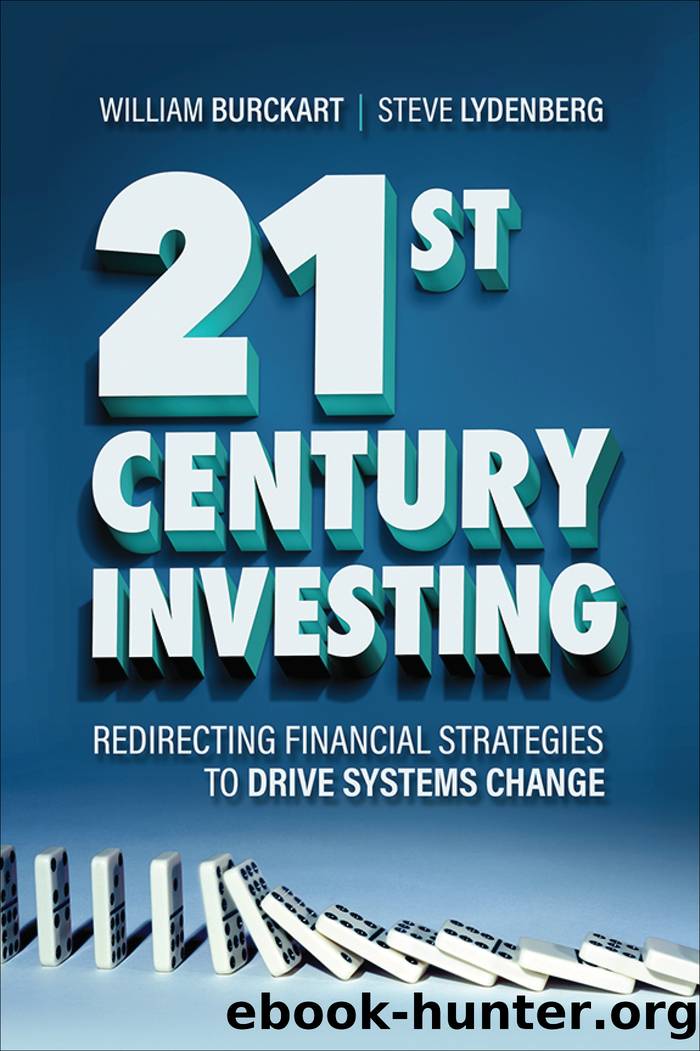21st Century Investing: Redirecting Financial Strategies to Drive Systems Change by William Burckart & Steve Lydenberg

Author:William Burckart & Steve Lydenberg
Language: eng
Format: epub
Publisher: Berrett-Koehler Publishers, Inc.
Principles, Assumptions, and a Way Forward
The best place to start in measuring and assessing system-level investments is what evaluation expert Michael Quinn Patton calls a âprinciples-focused evaluation.â8 Using a framework based on principles âprovides guidance for making choices and decisions, is useful in setting priorities, inspires, and supports ongoing development and adaptation.â9 In addition, âPrinciples-focused evaluation examines (1) whether principles are clear, meaningful, and actionable, and if so, (2) whether they are actually being followed and, if so, (3) whether they are leading to desired results.â10
From these foundations of principles-focused evaluations, investors can make sense of their managersâ performance by keeping four key assumptions in mind. These assumptions are, relatively speaking, simple, straightforward, and hardly original. Together, however, they can provide a base on which to build a method that investors can use to evaluate their managersâ relative performance in achieving positive, system-related, social and environmental impact.
The first assumption is that the overall consistency of managers is essential. Sustainable investors today tend to assume that impact can be measured solely by considering outcomes. In practice, the challenge is more complicated. Managers can undermine their outcomes achieved through unjustified claims and countervailing deeds. Consistency in managersâ character, actions, and outcomes is necessary to ensure impact is sustainable.11
If managers tout their investments in solar or wind power, for example, as a positive outcome for contending with global warming but simultaneously invest heavily in fossil fuels because they believe that a viable economy will depend on oil, coal, and natural gas into the foreseeable future, they may be counteracting the positive outcomes they profess. Similarly, if they publicly assert that a transition to alternative energy is urgently needed but lobby for tax breaks for fossil fuels in order to benefit their portfoliosâ holdings, they also undermine those positive outcomes.
The second assumption is that it is valid for investors to use qualitative judgment as well as qualitative metrics in making system-level investment decisions. Todayâs managers are well trained in portfolio risk control, using quantitative data to identify pricing anomalies, opportunities to diversify risk, and effective hedging maneuvers. When systemic social and environmental risks and rewards are the challenge they face, unintended consequences are a constant danger. Judgment and the flexibility to readjust are needed to fill the void.12
In evaluating their managers, investors must honor the necessity for the use of judgment and then assess the quality of that judgmentâa quality that, for better or worse, cannot be easily captured in quantifiable data. If, for example, investors are contending with the complex systemic challenges of income inequalityâcovered in chapter 7âgiven the systemic risks it poses to political instability around the world today, they will need to evaluate managersâ judgment in how best to contend with complex contributing factors such as companiesâ labor, tax, and CEO compensation practices. Each involves multiple interconnected factors. To address them requires managersâ judgment on how best to measure the consequences of their decisions.
Judgment with respect to systemic impacts is similarly essential in the financial realm, as Amar Bhidé points out in A Call for Judgment.
Download
This site does not store any files on its server. We only index and link to content provided by other sites. Please contact the content providers to delete copyright contents if any and email us, we'll remove relevant links or contents immediately.
What's Done in Darkness by Kayla Perrin(26300)
Shot Through the Heart: DI Grace Fisher 2 by Isabelle Grey(18826)
Shot Through the Heart by Mercy Celeste(18705)
The Fifty Shades Trilogy & Grey by E L James(18632)
The Subtle Art of Not Giving a F*ck by Mark Manson(13942)
The 3rd Cycle of the Betrayed Series Collection: Extremely Controversial Historical Thrillers (Betrayed Series Boxed set) by McCray Carolyn(13876)
Stepbrother Stories 2 - 21 Taboo Story Collection (Brother Sister Stepbrother Stepsister Taboo Pseudo Incest Family Virgin Creampie Pregnant Forced Pregnancy Breeding) by Roxi Harding(12871)
Scorched Earth by Nick Kyme(12530)
Drei Generationen auf dem Jakobsweg by Stein Pia(10758)
Suna by Ziefle Pia(10694)
Scythe by Neal Shusterman(10056)
International Relations from the Global South; Worlds of Difference; First Edition by Arlene B. Tickner & Karen Smith(9308)
Successful Proposal Strategies for Small Businesses: Using Knowledge Management ot Win Govenment, Private Sector, and International Contracts 3rd Edition by Robert Frey(9121)
This is Going to Hurt by Adam Kay(8773)
Dirty Filthy Fix: A Fixed Trilogy Novella by Laurelin Paige(7407)
How to Make Love to a Negro Without Getting Tired by Dany LaFerrière(6794)
He Loves Me...KNOT by RC Boldt(6682)
Unleashing the Power of UX Analytics: Proven techniques and strategies for uncovering user insights [Team-IRA] [True PDF] by Jeff Hendrickson(6482)
Wolf & Parchment: New Theory Spice & Wolf, Vol. 10 by Isuna Hasekura and Jyuu Ayakura(6361)
